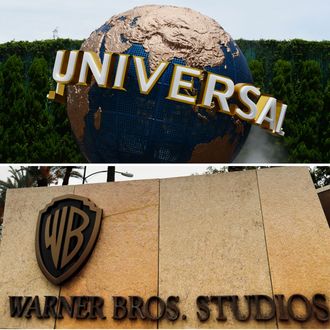
Studios have been trying to shrink the traditional 90-day release window between a movie’s opening and its availability to stream since 2011, and they might finally be making progress. The so-called “premium home window” could help studios recoup lost revenue from lagging DVD sales, and would make a new title streamable at least 17 days after its release. (To put that in perspective: Kong: Skull Island came out on March 10. Under the proposed streaming agreement, for a fee of $30 to $50, Kong could be available to stream right now.) At last year’s CinemaCon, Sean Parker floated a similar idea with his third-party site Screening Room, which would make tentpoles and buzzy new releases available for rental the day they opened in theaters; a lot of people hated the idea. But now, the idea of a shortened window is gaining more traction, though no one can decide how it could best be implemented to the benefit of filmmakers, studios, exhibitors, and home audiences. Here’s where the major players stand:
Who’s For It
The big studios — particularly Warner Bros., Universal, and Fox — are in favor of shortening the release-to-streaming window. No one has decided on an appropriate price or release schedule, according to Variety. Warner Bros. CEO Kevin Tsujihara was the first to float a 17-day window/$50 rental proposal, but other studio execs found that price too steep. Universal wants to keep a 20-day window, Variety reported, while Fox and Warner Bros. seem more open to cutting the 90 days down to 45 or 30, but for $30 for a rental. Also in contention: which movies can or should be made available to rent early. Universal is in favor of releasing all of its movies according to the shorter time frame, while Warner Bros. and Fox want to stagger the early rentals based on a title’s popularity, probably to give tentpoles longer theater exclusivity.
Other studios like Sony, Lionsgate, and Paramount are also in favor of cutting down on the 90-day convention, but they’re in separate negotiations with a group of exhibitors that includes AMC, Regal, and Cineplex.
(When the Screening Room made a splash at last year’s CinemaCon, J.J. Abrams, Steven Spielberg, Ron Howard, Brian Grazer, and Peter Jackson all supported the divisive proposal that would cut out a release window entirely, so it’s likely they’re in favor of a more prudent proposal by the studios.)
Who’s on the Fence
Theater chains. Any cuts to the existing 90-day window would have repercussions for exhibitors, DVD sales, and how quickly a movie can be shown on TV. Theater chains that work with studios on the shorter window would get a percentage of the money made from digital streaming, but how the money would be divided is up in the air. “The whole idea shows lack of control. Look at what happened to the music and book industry once everything became available digitally. If you have Spotify, why do you need Tower Records? The whole idea will make theater-going obsolete. I don’t believe big screens and premium VOD can co-exist,” one anonymous theater exec told Deadline.
Who’s Against It
This week, while at CinemaCon promoting his new war epic Dunkirk, Christopher Nolan said that showing his movies on the big screen was his focus. “The only platform I’m interested in talking about is theatrical exhibition,” he said, moments after Warner Bros. worldwide marketing and distribution president Sue Kroll talked up VOD models. At last year’s CinemaCon, James Cameron, Todd Phillips, and Nicolas Winding Refn all opposed the Screening Room.
Who Doesn’t Really Care
Disney is pretty absent in these talks, according to Variety. People want to see their franchise behemoths like all the Marvel and Star Wars movies on the big screen, so they’re in no rush to get involved.


